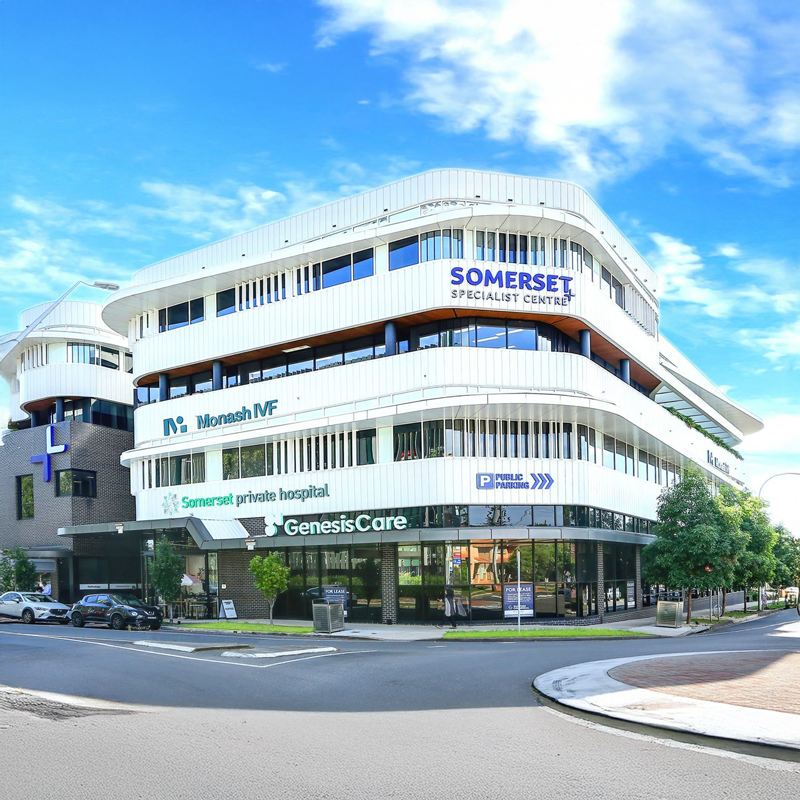- Our centres
- Kingswood

Kingswood
Ground Floor, Somerset Specialist Centre, 38 Somerset Street, Kingswood, NSW, 2747, Australia
Overview
Services
GenesisCare, Kingswood offers personalised cancer care services including radiation therapy, chemotherapy, immunotherapy, and haematology.
Located near Nepean Hospital, our Kingswood centre offers a personalised cancer care experience, with rapid access to consultation and treatment in a comfortable and welcoming environment.
Care is delivered by a multidisciplinary team of experienced healthcare professionals, including radiation oncologists, medical oncologists, registered nurses, radiation therapists, physicists and a dedicated support team.
The centre is located on the ground floor of the Somerset Specialist Centre and offers free onsite parking for patients during treatment. Consulting rooms are located on Level 2 and feature views towards the Blue Mountains.
Our treatments and services
Radiation therapy uses high-energy X-rays or other particles to treat cancer. It can be used at different stages of treatment, either on its own or alongside other treatments.
Radiation therapy techniques offered at GenesisCare, Kingswood may include:
- External beam radiation therapy (EBRT)
- Volumetric modulated arc therapy (VMAT)
- Intensity modulated radiation therapy (IMRT)
- Stereotactic ablative body radiotherapy (SABR)
- Stereotactic radiosurgery (SRS)
- Deep inspiration breath hold (DIBH)
We also offer specialised, non-surgical treatment options for some skin cancers.
Radiotherapy for benign conditions
We offer specialised, non-invasive radiation therapy techniques for the treatment of non-melanoma skin cancer and some benign conditions. These may include osteoarthritis, Dupuytren’s disease, keloid scars, Ledderhose disease and ectopic bone.
Chemotherapy is a type of cancer treatment that uses medicines, usually taken orally or given by injection, to kill cancer cells or slow their growth and spread. It may be used on its own or in combination with other cancer treatments.
Immunotherapy
Immunotherapy is a type of treatment designed to help your own immune system recognise and fight cancer. There are different types of immunotherapy, which work in different ways depending on the cancer type.
Haematology is the medical specialty that focuses on conditions affecting the blood and blood-forming organs, including blood cancers. A haematologist provides specialist care for patients with blood disorders or blood cancers and may prescribe chemotherapy as part of treatment. They may also refer patients to other specialists within the multidisciplinary team, such as a radiation oncologist, if radiotherapy is recommended.
Allied health
We offer access to a range of allied health services, tailored to support your individual needs. A member of your treatment team will discuss the most suitable options with you.
Services available on site may include:
- Dietitian
- Speech pathologist
- Massage therapist
- Virtual psycho-oncology services
- Pharmacy
- Nepean Pets as Therapy
- McGrath nurses
We also work closely with a range of cancer support services in the region to provide holistic support, which may include:
- Palliative care referral services
- Rehabilitation referral services
- Virtual support for patients
Free Wi-Fi is available at this centre.
Complimentary patient parking, including disabled spaces, is available in the underground car park, entry via Derby Street. Parking is also available in surrounding streets
Kingswood train station is a short 10 minute walk to Somerset Specialist Centre. It also has easy access to bus routes. Conveniently, bus stops are located on Derby St which is adjacent to Somerset Specialist Centre.
Disclaimer:
This website is provided for information purposes only. Nothing on this website is intended to be used as medical advice, or to diagnose, treat, cure or prevent any disease. It should not be used as a substitute for your own health professional's advice. Any medical procedure or treatment carries risks. Before proceeding with treatment, you should discuss the risks and benefits of the treatment with an appropriately qualified health practitioner. Individual treatment outcomes and experiences will vary.


